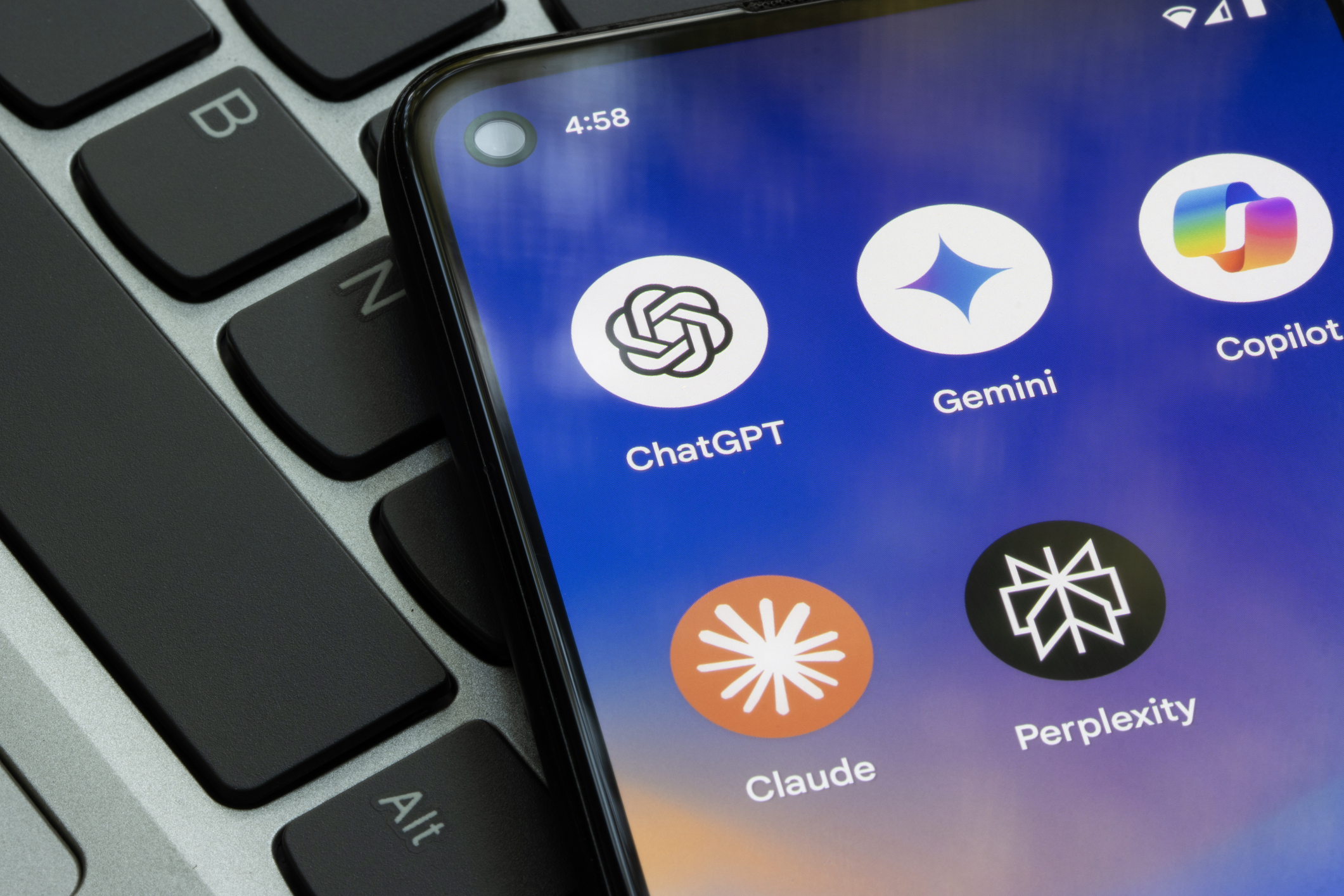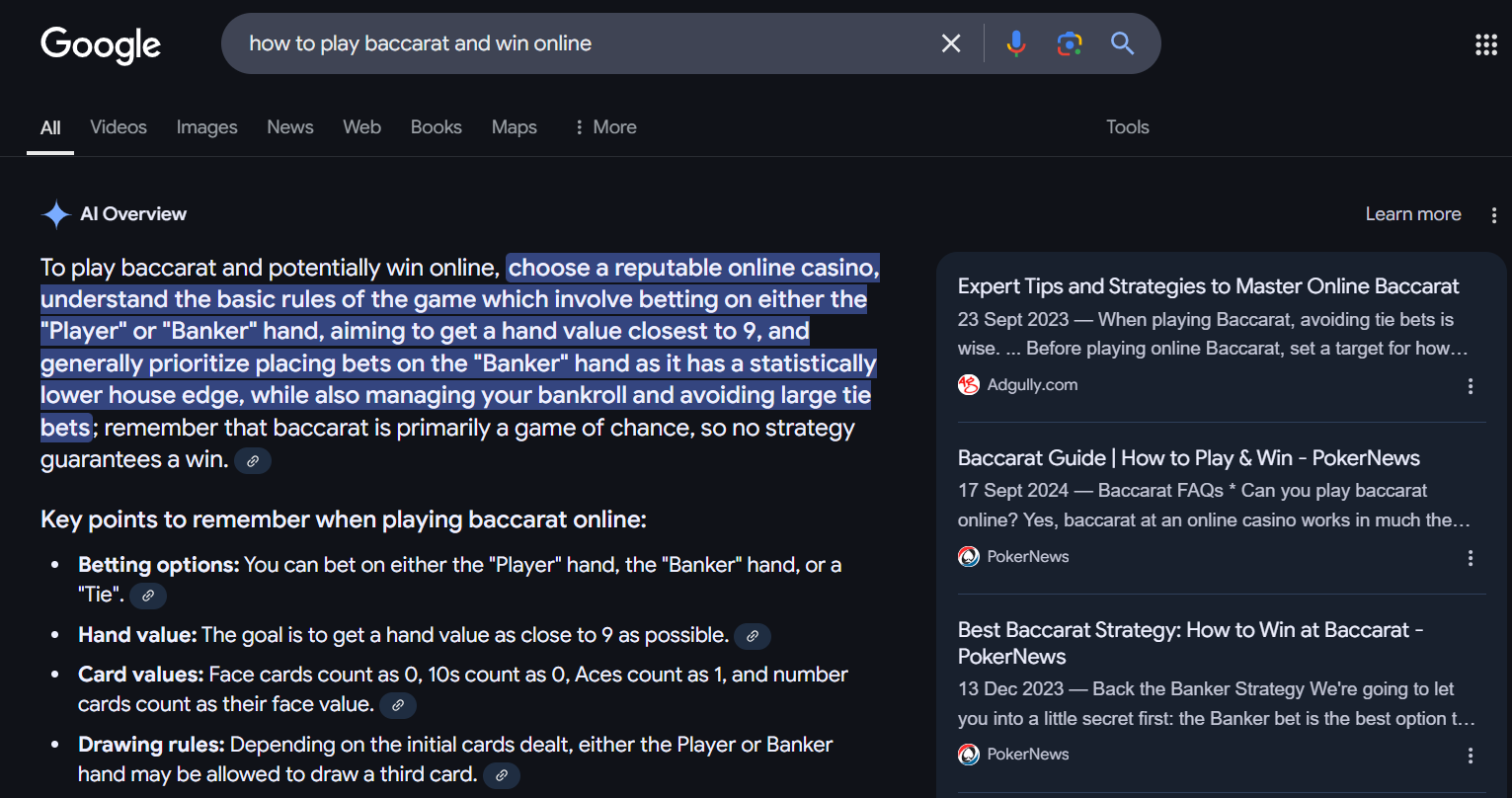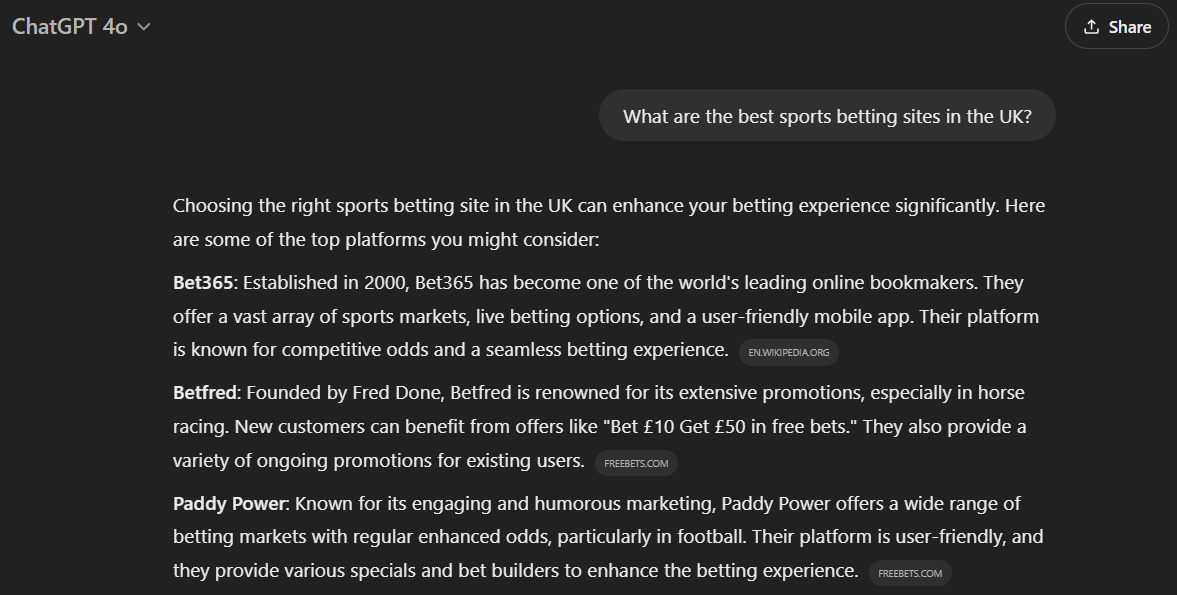

As AI creeps into the search landscape and summarises answers for user queries, zero-click searches are on the rise. But is the igaming sector facing the same threat? We speak to SEO experts and affiliates about why Google’s AI Overviews and other generative search engines may not hit gambling-related queries as hard as other industries – and explore strategies affiliates can use to stay ahead in the evolving search landscape.
Since ChatGPT went public two years ago, every major tech company has joined the race to build its own AI model. Google is no exception, launching its chatbot Bard (now Gemini) just a few months later. Then last May, it dropped the AI Overviews (AIOs) feature to the search landscape, generating answers to users’ queries while hogging the top of SERPs.
The rollout caused a wave of distress in the SEO world. With 2024 already marked by frequent policy and algorithm updates, the introduction of AIOs added yet another layer of complexity for search professionals. The public reaction has been mixed. Although Google asserts that the new feature is well-received across user segments, the model is notorious for making errors, with its most infamous blunder being the suggestion to add glue to pizza.
But love it or hate it, AIOs aren’t going anywhere. In Alphabet’s latest earnings call this February, CEO Sundar Pichai said “2025 is going to be one of the biggest years for Search innovation” and called AIOs the next step of Google. Meanwhile, rival AI search engines such as Perplexity and ChatGPT Search are entering the game, offering users more options when looking for answers online. The future of search is in a state of flux.
If Google were to start surfacing AI-generated answers that inadvertently promote these problematic casino brands, it could put them in a complex legal position
Don’t hit the panic button yet
In the high-stakes world of igaming and affiliate marketing, every click counts. However, with the rise of AI search engines delivering instant answers, how many users will bother clicking citation links or scrolling through the SERP? For many SEOs, this question has become their most pressing concern.
The latest research only seems to confirm their worries. A report from Seer Interactive found that AIOs are contributing to declines in both organic and paid click-through rates (CTRs). Notably, organic CTRs dropped sharply by 0.64% to 1.41% over the past 12 months when AIOs were present, whereas they increased when AIOs were absent (2025).
Although the statistics might appear to indicate an impending doomsday, Luke Taylor, on-page SEO specialist at Legend, emphasises that now is still too early to determine the full impact of AI search on the igaming sector.
“Whenever there's a significant change in the organic landscape – whether it's a major algorithm update like Penguin and Panda or the introduction of featured snippets – there’s always that initial panic, so I think saying that AIOs are going to kill organic traffic is a bit of a knee-jerk reaction,” he says.
As Taylor notes, the sensitive nature of gambling queries works in affiliates' favour, making it difficult for Google to implement AIOs in the igaming sector. Unlike broader topics such as healthcare and education, where AIOs appear in over 50% of searches, gambling-related answers are far less common, mostly limited to specific “how to play…” questions (below). While there’s no official confirmation that igaming queries are restricted in AIOs, Google’s recent tightening of gambling advertising policies to reinforce country-specific restrictions suggests it may apply similar caution to AI-generated answers.

“In the US, for instance, some sites ranking for major gambling-related search terms are promoting offshore casinos, Telegram-based casinos and crypto casinos – many of which don’t have the best reputations. If Google were to start surfacing AI-generated answers that inadvertently promote these brands, it could put them in a complex legal position, and that’s a risk they likely want to avoid,” Taylor explains.
In addition, ex-Googler and SEO consultant Kaspar Szymanski emphasises that AIOs tend to cover informational queries with “limited conversion potential” rather than transactional queries, meaning that the “impact on revenue-driven websites may be less significant in the long run”. The aforementioned report also indicates that paid and organic CTRs have actually increased when a brand’s name is mentioned in AIOs, potentially offering affiliates an opportunity to capitalise on this visibility.
Though other AI search engines can answer a broader range of igaming queries (below), Taylor believes that “outside of the little world of the marketing bubble” affiliates are in, most players “won’t lean heavily into such platforms to find recommendations for bonuses and commercial products”. Moreover, Mykhailo Kachanov, head of affiliate at SlotCatalog, points out that AI responses are usually less reliable when summarising news content, such as upcoming slot releases and the latest industry trends.

After all, in the igaming niche where players value genuine advice, AI cannot answer all their questions. As igaming consultant and media buyer Greg Gomes suggests, users will continue to prefer human-curated responses for their level of detail and community engagement.
“I don’t think an AI can interact on a human level and relate to communities. AI search is coming a lot faster than I expected, but the human touch is still needed for content authority,” says Gomes.
E-E-A-T still matters
Frustratingly, unlike traditional SEO, much of the inner workings of AI search remain a mystery. As Szymanski explains, the only certainty is that “the process is entirely algorithmic”, given the “sheer volume of content involved”.
“There is very little public information about the specifics. Tech companies are understandably tight-lipped about proprietary solutions that could provide a competitive advantage.”
AI understands intent rather than just keywords. People interact with AI search more like they would with a person
But this doesn’t mean affiliates cannot take a guess. Research has found that around 75% of links cited in AIOs appear in position 12 or higher in the organic search results.
“You are only going to appear in AI search results if you are ranking highly. A site needs to meet the E-E-A-T (Experience, Expertise, Authoritativeness, and Trustworthiness) standard along with strong social engagement to demonstrate expertise and authority, so optimising for AI still involves good traditional SEO practices,” says Gomes.
Kachanov points to three directions for generative engine optimisation. An accurate and thorough schema markup remains crucial for helping AI interpret site content by providing deeper contextual meaning and clarifying relationships between entities on a site. Writing in a conversational style and optimising for voice search are also relevant, as “AI prioritises responses that match these natural speech patterns”.
“AI understands intent rather than just keywords. People interact with AI search more like they would with a person. They ask full questions instead of typing fragmented keywords,” Kachanov explains. “For example, instead of typing ‘best slots RTP high’, a user might ask, ‘What are the best high RTP slots?’. If your content reads in a way that directly matches how people talk, it's more likely to be featured in AI-generated results.”
While Taylor says affiliates wouldn’t need to adjust their strategies drastically, he believes AIOs may give rise to “another facet of digital PR”, considering that large language models (LLMs) used by AI search engines work by predicting the next word in a sentence.
“Instead of just using digital PR to gather backlinks for a domain, it might shift towards ensuring your brand is consistently mentioned alongside key search phrases you want to be associated with. As a result, LLMs and their search products may start surfacing your brand more frequently.
Everyone should focus on attracting traffic from other sources and build a unique product that will bring practical benefits to players. This is especially true for small and medium-sized affiliate sites
However, Szymanski notes that monitoring content displayed in AIOs can be difficult due to their inconsistent triggering. Currently, Google doesn’t offer AIO filters in Search Console and is reportedly blocking third-party tools for detecting AIO content. Though manually searching remains an option, Szymanski says “it may not be the most efficient use of time”, as even the most accurate tracking won’t provide insights into conversions and revenue.
Road Lexx, founder of bitcasinosrank.com, sees the AI search storm as a reminder of the crucial role diversification and community-building play in maintaining independence from Google traffic.
“Everyone should focus on attracting traffic from other sources such as social networks and build a unique product that will bring practical benefits to players. This is especially true for small and medium-sized affiliate sites. They will either change or die,” Lexx says.
Stay tuned for the future
Generative search engines are still in their infancy, and there will be more changes to come. This year, Google is dreaming big for AI. As revealed in Alphabet’s earnings call, Google is currently testing Gemini 2.0 in Search. It has also recently launched ads for US mobile users and introduced detailed shopping comparisons within AIOs.
We will have to wait and see whether the so-called generative search experience will be widely accepted and embraced by users
Given the high profitability of the igaming sector, Taylor acknowledges that Google might gradually increase the visibility of gambling content in AIOs if it sees bigger rewards than risks – and even start listing real-time gaming odds. But Szymanski plays down the latter’s possibility, noting that “it’s unlikely to become a top priority for Google” as the feature doesn’t reflect the needs of the majority of users.
“SERPs will undoubtedly continue to change – they are in constant flux, driven by Google's ongoing tweaks and updates. While it may sometimes seem like certain types of content are becoming less visible, this ultimately depends on user queries, which also evolve over time as users change their search behaviour and interests shift,” he explains.
Furthermore, consumer trust will be a key factor in deciding AI search’s future. Szymanski suggests affiliates “wait and see whether the so-called generative search experience will be widely accepted and embraced by users”, noting that despite AI companies’ ongoing push, “it’s reasonable to expect that many users will remain sceptical given the current quality of generative search results”.
That said, now is not the time to sit back and relax. With AI search engines evolving rapidly, this piece might feel archaic in just a year. Though there’s no need to hyper-fixate on generative search optimisation, the consensus is that affiliates must stay proactive, keeping up with trends while maintaining strong SEO fundamentals and producing content that resonates with human players. In this shifting landscape, it seems the winners will be those who learn fast and adapt swiftly.
